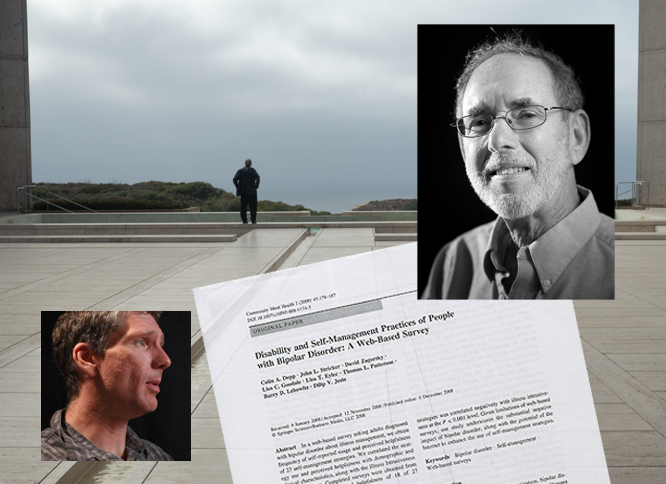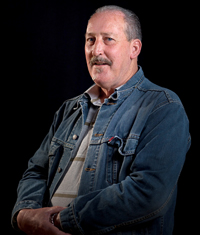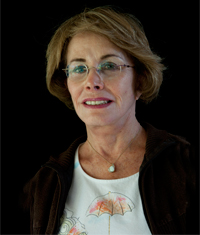RESEARCH: David
University of California, San Diego
Hartford Center of Excellence in Geriatric Psychiatry
I never tell people, ‘Hey I’m bipolar.’ I saw a TV show where a guy with a mental illness pulls out a knife. It’s a shame that this is the perception that people have. It shouldn’t be like that. Being bipolar should be just something that I happen to be, like being right-handed.
Several years ago I became reclusive and a psychiatrist suggested I join the Depression and Bipolar Support Alliance. I eventually became a peer facilitator and I became very adept at that. While doing that I met Dr. Colin Depp and got involved in some interesting studies he was conducting. I’m very opinionated so I had a lot of fun doing it.
I co-authored a study with Colin looking at how people with bipolar disorder cope with the illness. One lady in the study said she knew she was starting to get ill when she wasn’t taking care of her garden. The plants were dying. This type of research is critical because it’s not hard science like sequencing the genome. This is dealing with people. We need people like Colin to deal with people like me.
Having a mental illness is like pushing a rock up a hill and it’s always coming back at you. People see mentally ill people as weak. To me, it takes even more strength than the average person has.
–David

Colin A. Depp, PhD
Assistant Professor
Department of Psychiatry, School of Medicine
University of California, San Diego
Hartford Center of Excellence in Geriatric Psychiatry
University of California, San Diego,
Hartford Center of Excellence in Geriatric Psychiatry

David
Improving Care for Older Adults with Mental Illness
“Older adults with schizophrenia, bipolar disorder, and other mental illnesses are among the most disenfranchised groups in the country,” says Dr. Dilip V. Jeste, Director of the Hartford Center of Excellence in Geriatric Psychiatry at UCSD. They are older and they have serious mental illness, yet they are the least likely to get adequate care for their mental and physical health problems. “Our research goals are to understand the basic pathology of these illnesses and to improve interventions for them,” he says.
Research at UCSD focuses on psychosocial and behavioral inter-ventions in addition to medication management. Dr. Jeste and his colleagues have developed and tested several interventions, such as cognitive behavioral therapy, social skills training, and work rehabilitation. Hartford-funded Scholars are actively participating in these studies as researchers and by implementing and disseminating innovative interventions.
Aging with Bipolar Disorder
What is Bipolar Disorder?
Bipolar disorder is a mood disorder that was previously called manic depressive disorder. There are different types of bipolar disorder, and thus the experience of this illness varies widely. In general, it’s characterized by shifts from periods of higher energy and activation called mania to periods of depression and reduced energy. During the manic phase there’s often a sense of euphoria, little need for sleep, and racing thoughts. Some people don’t experience the elation. Instead they become very irritable. Episodes of full-blown mania generally don’t last long, possibly two or three weeks. During this phase people with the disorder may engage in impulsive or irrational actions. Sexual activity tends to increase. They may engage in risky sexual behaviors impulsively without having a history of such behavior.Some people with bipolar disorder have delusions, such as having special abilities or gifts. They may have very exaggerated beliefs that are out of touch with reality; for example, they may believe that somebody famous is in love with them.
After the manic phase there’s a tendency to lapse dramatically into a depression, which lasts much longer than the manic phase. The depression in a person with bipolar disorder tends to be more severe than in a person who has major depression without the mania. Depression in bipolar disorder is generally harder to treat, and thus is the most disabling aspect of the illness for most people. Some people with bipolar disorder will have just one episode of mania in their entire lifetime and struggle with depression for the rest of their life.
Ipsit V. Vahia, MD
Hartford Scholar
Assistant Professor, Department of Psychiatry
University of California, San Diego
David, who is 67 years old and was diagnosed with bipolar disorder as a young man, participates in research at UCSD. About 30 years ago, he was told by a medical professional to expect the severity of bipolar disorder to get worse with age with more frequent episodes. “I told myself, whatever happens I have to work against that,” says David. “I became hyperaware of when I started ratcheting down or up.” To help with his mood changes, David developed some coping strategies. For example, “I try to keep myself in the moment, take deep breaths, and meditate,” he says. “It took me a long time to learn that. It’s not something at 24 years of age I would have thought of doing.” David notes that each person with bipolar disorder needs to learn techniques that work for them.
David has identified three key aspects of managing his illness. First is medical management, which involves appropriate drug therapy. Second is recognizing the triggers when his mood is going markedly up or down. And third is having a support system, which includes health professionals like psychiatrists and psychologists and also family members and people he trusts. “One thing I preach to other people with bipolar disorder is to have a mirror,” says David. “A mirror is someone you trust who can tell you honestly, without being spiteful, that you’re not acting normally. You have to set that up when you’re feeling rational.”
With the help of David and others with bipolar disorder, the researchers at UCSD are identifying specific coping techniques. “In general, we find that older adults with bipolar disorder do better if they’re provided adequate care and social support,” says Dr. Jeste.
Aging with Schizophrenia
What is Schizophrenia?
Schizophrenia is a psychotic disorder, or psychosis. The name schizophrenia means break from reality. It’s characterized by a cluster of symptoms, such as auditory hallucinations (hearing voices), other forms of hallucination (such as seeing, feeling or smelling something that isn’t there), delusions (false unshakable beliefs), and disorganized thinking. People with schizophrenia may act in ways that are grossly inappropriate or out of the norm of what is acceptable in society. They may mutter to themselves and have an inability to generally take care of themselves without having any insight into why. These are called “positive” symptoms. People with schizophrenia may also have “negative” symptoms, such as lack of motivation, inertia, or lack of facial expression. Not everyone with schizophrenia has all the symptoms.
Subtypes of schizophrenia include paranoid type, disorganized type, and catatonia (characterized by muscle rigidity and unresponsiveness, sometimes alternating with great excitement and confusion). The classification of schizophrenia is based solely on symptoms rather than any biological or neurological findings.
Ipsit V. Vahia, MD
Hartford Scholar
Assistant Professor, Department of Psychiatry
University of California, San Diego
What Dr. Iglewicz found interesting about this man was that his symptoms actually became more tolerable as he got older. “He explained that he still had the experience of hearing voices that other people couldn’t hear, but he was able to make sense of it in a way he wasn’t able to when he was younger,” says Dr. Iglewicz. This experience is typical of many older adults with schizophrenia.
Dr. Jeste, whose research focuses on older adults with schizophrenia, must often fight against the conventional belief that schizophrenia is a dementing illness that starts early in life and only gets worse with age. “One of the goals of our work has been to look at what factors increase the chances for older people with schizophrenia to recover and to have sustained remission from their illness,” he says. Remission means that the person has only a minimal degree of symptoms. As an example, Dr. Jeste cites John Nash, the Nobel Laureate, who has paranoid schizophrenia and was the subject of the film A Beautiful Mind. As he got older he started to get better. By studying how high-functioning people with schizophrenia manage their illness, Dr. Jeste and his colleagues hope to find ways to help everyone who struggles with this illness.

The researchers at UCSD are also studying late-onset schizophrenia. While schizophrenia usually starts early in life, Dr. Jeste and his colleagues have found that it can manifest for the first time in older age. Late-onset schizophrenia tends to be more common in women than in men, is usually the paranoid type, and there are different treatment considerations.
“For many older adults with schizophrenia or bipolar disorder the biggest problems are societal attitudes, stigma, and poor health care,” says Dr. Jeste. Through their research, Dr. Jeste and his colleagues are attempting to change attitudes, so that people with mental illness can be seen as real people who happen to have these illnesses. “They are getting older and we can help them get better,” he says.
Complicated Grief

Drs. Zisook and Iglewicz have found that complicated grief lasting six months or more can become very difficult to treat. Standard treatments for anxiety or depression, including medications and psychotherapy, tend not to be effective. A new form of treatment called “complicated grief therapy,” which is a hybrid of several forms of psychotherapy, was developed by Katherine Shear, MD, at the University of Pittsburgh School of Medicine, a Hartford Center of Excellence in Geriatric Psychiatry. An initial study showed that this therapy is effective.
Dr. Shear is now conducting a larger, multi-site study to further test the intervention and to study the potential role of medications, alone or in combination with complicated grief therapy.
Rosalee, age 76, lost her husband three years ago after a long illness that was misdiagnosed for years before correctly confirmed as a rare, fatal brain disorder. The illness was devastating both to his physical and mental functioning. Caring for her husband with the multiple medical problems associated with his disease became a tremendous burden for Rosalee. She eventually moved him to a nursing home.
“After Art died I had this ongoing movie in my head of the last days of his life,” says Rosalee. “On the day Art died I was at the funeral home to finalize things. My daughter was with him. She called and said, come back, Art’s going. I hit every red light on the way back and I got back just after he finished his last breath. He was gone. I couldn’t get away from that movie in my head. Art had been dead for two years when I saw an announcement about the grief study.
“After the death of her husband Rosalee became frozen in grief, and she never talked to anyone about it,” says Dr. Iglewicz, adding that “she did beautifully in the study.” “The movie stopped and the grief became less intense,” says Rosalee.
Translating Research to Practice
“I believe it is not enough to just develop and test interventions,” says Dr. Jeste. “We have to see if they are useful in everyday practice.” Therefore, UCSD has partnered with the San Diego County Public Mental Health System, which provides care for about 40,000 adults. “Our studies have shown that the interventions we’ve developed are indeed practical.”In addition, Hartford Scholars are participating in efforts to translate research to practice. For example, Ipsit V. Vahia, MD, Assistant Professor, Department of Psychiatry, University of California, San Diego, and a Hartford Scholar, studies late-life schizophrenia and successful aging. “I’m in the unique position of being able to apply my research findings to the patients I see in the clinic,” says Dr. Vahia. Many people believe that if they have the burden of a diagnosis like bipolar disorder or schizophrenia this is an impediment to aging successfully.
Dr. Vahia translates his research findings into reassuring messages for his patients. “I’m able to tell them that coping with bipolar disorder is not that different from coping with something like diabetes or hypertension,” says Dr. Vahia. “They are different illnesses, but on a day-to-day basis it comes down to taking medications every day. A simple statement like that can make a big difference to their morale, and they leave feeling better, which is ultimately our goal.”